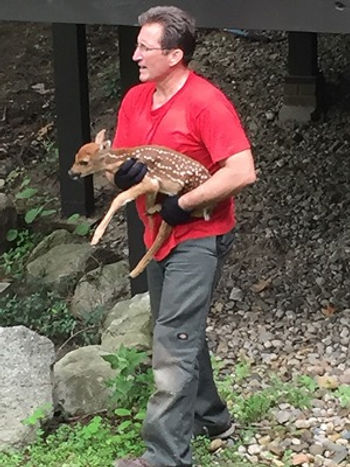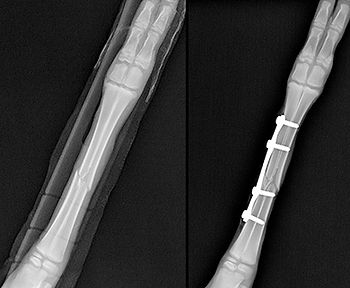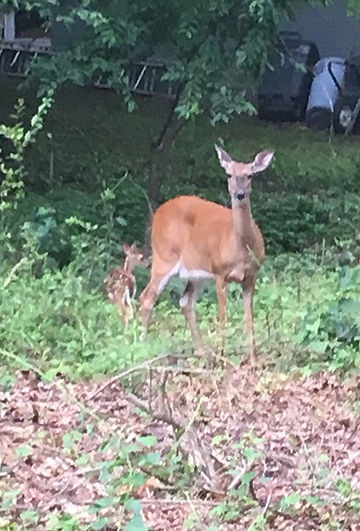Reuniting Wildlife
Some days it seems like all the veterinarians in LaPorte County and Michigan send us their request for wildlife orphan care. We always get excited when we can fix them up and quickly release them in the first few days or week. We want to share two such examples we were able to celebrate at the hospital.

The first one was easy. It only involved Dr. Bailey crawling under a deck and into a basement window well to remove a small fawn (less than 10 days old) and release it back into the woods. Dr. Bailey was surprised when after being stuck overnight, the fawn still had the strength to run off into the woods to find its mother.
The second was a fawn found at a construction site. Some of the workers spotted the injured fawn and carfully brought her to us. She had a severe fracture on one of her rear legs.
The best chance to return her to her mother (where she belonged) was to repair the leg quickly and release her back to the same area. (We were told by the construction workers that the fawn’s mother was still looking for the baby all
afternoon and evening).

Dr. Bailey decided to keep staff members after hours to repair the leg with a bone plate and put in buried absorb-able sutures. He was able to release the fawn to the same area in Michiana Shores the next morning by 6am after feeding her for 24 hours with a special milk replacer.

This photo was sent to us by a neighbor near the site a few days later. It is hard to tell in the photo, but it is the same fawn, with the hair clipped on one of the rear legs.
If you come across orphaned wildlife, Dr. Bailey stresses first and foremost to leave the wild orphan where you found it, return it to the nest or area found whenever possible. Animals like mother deer and rabbits only return to the nest (location) at night or when no one is in the area. And remember that even if you touched the animals that does not keep the mother from taking care of the baby.
Recently, we have had 5 baby birds brought to our office. We will raise them to be released but would encourage good Samaritans to go to extremes to replace them to the nest or replace them next to the tree and the momma bird will take care of them.
The wild orphans that are taken in by humans have a 10 times less likelihood of surviving into adulthood and even a smaller chance of being releasable back into their natural environment “where they belong”.
No wild animal should ever be kept as a pet; they were bred for hundreds of years to be free outside. Sometimes we have no choice but to care for these animals, rehab them, and then release them if they are injured or truly orphaned. We do provide this care without compensation but would encourage you to leave the orphans where they are found for their sake.
The Indiana DNR has great instructions for orphaned wildlife called “WHAT DO I DO IF I FIND AN ORPHANED ANIMAL?”, including a list of wildlife rehabilitators.
